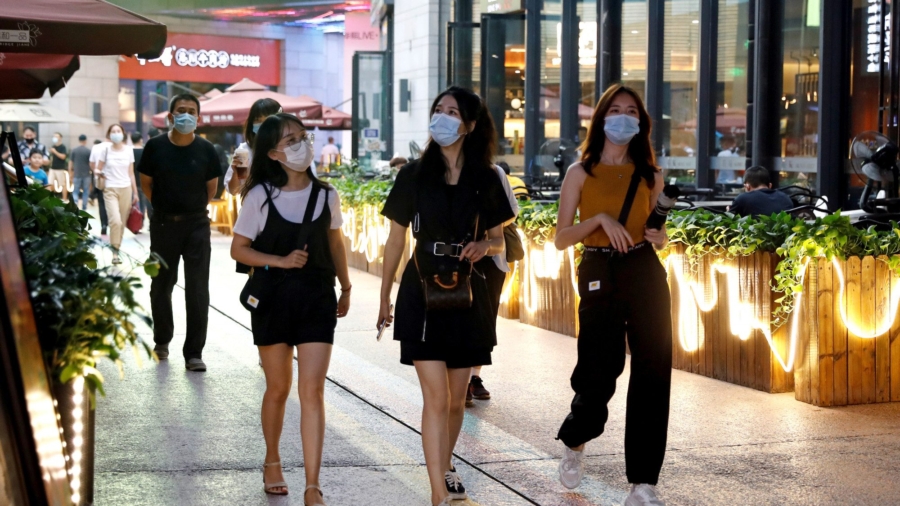The severity of the latest CCP virus outbreak in Urumqi, the capital of western China’s Xinjiang region, is under scrutiny as local authorities have taken draconian measures to contain the virus.
Local health authorities in Urumqi said during a press conference on July 18 that there were a total of 17 confirmed virus cases in the city as of noon local time on July 18, in addition to 23 asymptomatic cases. Chinese authorities count asymptomatic carriers in a separate tally.
By Sunday morning, the local health commission reported on its website that there were 13 new confirmed cases and 18 new asymptomatic cases between Saturday noon to midnight. About 2,705 people under medical observation.
But the way that Chinese authorities were quick to implement lockdown measures, and a subtle change to a recent article published by China’s state-run media People’s Daily, suggested that the outbreak in Urumqi was more severe than authorities would admit.
The current outbreak in Urumqi started on July 15, when a 24-year-old woman, a resident in Urumqi’s Tianshan District, tested positive for the CCP (Chinese Communist Party) virus, commonly known as the novel coronavirus. She worked for a shopping center at Zhongquan Square in Tianshan.
Local health authorities announced the woman’s infection case on July 16.
The infected woman was taken to a local hospital on July 10, after exhibiting symptoms that included a sore throat. Four days later, the woman began having a fever and headache. Three people who came in contact with the women were subsequently determined to be asymptomatic cases.
Measures
Local authorities were quick to enact strict measures to prevent the spread of the virus in Urumqi, a city of about 3.5 million people.
On July 16 evening, the Urumqi Metro announced the closure of its only operational subway line—a 26.5-kilometer line (about 16.4 miles) with 21 stations—in order to prevent the spread of the virus.
Also on July 16, Chinese state-run media reported that municipal authorities in Urumqi issued a directive, mandating local community authorities to implement prevention protocols: local officials should seal off their communities and provide delivery of daily necessities to those who were sick; local public transportation should greatly be reduced; local markets and hotels should not be open for business; and travelers arriving in Urumqi should be placed under quarantine for seven days upon arrival.
After the announced closing down of communities, video footages on Chinese social media showed people rushing to local markets to buy food and other living necessities.
On Friday, Chinese state-run media reported that hundreds of flights going in and out of a local airport had been canceled.
On Sunday, local authorities placed Urumqi under a “wartime state,” banning all gatherings in the city and declaring that all communities would be under “seal-off management.” Local residents were forbidden to leave the city except under special circumstances and citywide COVID-19 testing for all residents was underway.
Severity
The CCP’s mouthpiece newspaper People’s Daily, in an article published on July 18, quoted a hotel worker with the pseudonym Zheng Li. Local authorities had requisitioned the Urumqi hotel where he worked into a quarantine site.
In the original version of the article, Zheng was quoted as saying there were over 100 people placed under quarantine at the hotel on July 13—three days before local authorities reported the first confirmed case.
People’s Daily has since deleted Zheng’s quote from the article, but the original version without the deletion could still be found on Google Cache and some Chinese news sites that reposted the original article.
On July 16, the Chinese-language Epoch Times also obtained an emergency notice from one of the communities in Urumqi, showing that the virus could have spread widely in the city. It is unclear precisely when the notice was issued.
The notice called for community officials to look for people who recently attended wedding ceremonies in three districts of Urumqi: Tianshan, Saybag, and Shuimogou. It also named three places—a theater, pub, and ballroom—and asked for information on people who went there on July 5.
Also on July 16, a video showed a large crowd queuing outside of a hospital in Urumqi waiting to be tested for the virus.
A staff at the People’s Hospital in Xinjiang located in Urumqi told the Chinese-language Epoch Times that 3,000 to 4,000 people were being tested daily for the virus.
Meanwhile, a staff at a hotel nearby Zhongquan Square in Tianshan District told the Chinese-language Epoch Times that hotel patrons who wish to check out of the hotel must make travel arrangements with local officials.
The person said that there were barely any cars on the streets and the service of the local train had been suspended.
From The Epoch Times


